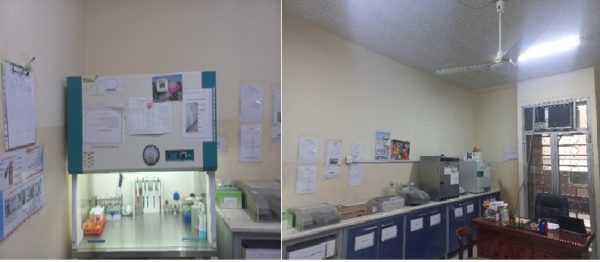Textile cutting laboratory
The histological sectioning laboratory provides scientific services to graduate and undergraduate students and research projects for department professors through making microscopic slides for the optical microscope and the mechanism of their preparation, distinguishing between preparation methods for different organs and tissues and for both animals and plants alike, and how to diagnose in the field of tissue diseases and healthy tissues and imaging sections. Histological. In addition to providing services to students from outside the college and laboratory under the supervision of specialized professors.

Plant tissue culture laboratory
The Tissue Culture Laboratory aims to prepare graduates who are able to understand the facts about the basics of tissue culture and keep pace with the rapid developments in this field, which enables the graduate to work in the functional fields that fall within this specialty or field. The laboratory also aims to prepare qualified graduates to work in the field of tissue agriculture, qualifying them to occupy work sites with high efficiency and having the ability to overcome the problems they face during laboratory work. In addition to preparing female specialists in the fields of plant tissue culture who hold a high academic qualification (Master’s and Doctorate) and scientific and practical experience that helps them solve problems and provide scientific and diagnostic consultations. The laboratory also aims to contribute to the development of scientific research in Iraq by conducting scientific research and contributing to solving the problems of state institutions related to workplace specialization.
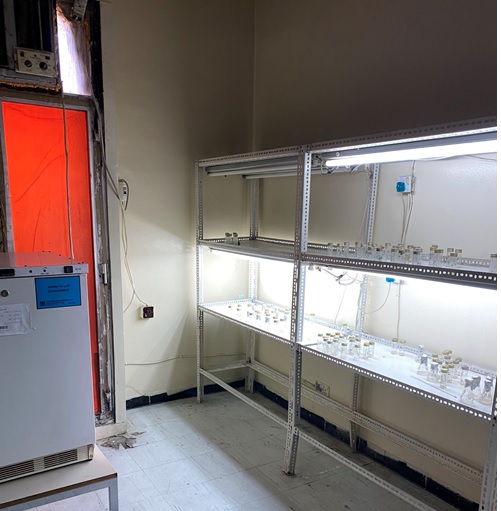
Plant Herbarium Laboratory
A herbarium is a library that contains all documents and records of all botanical information. Plants are preserved as a collection of dried and compressed specimens mounted on cardboard in an image similar to a live photograph of the plant as a referenceable record and managed by an official specializing in plant taxonomy. International rules require that specimens be preserved by their Latin scientific names and provided with comprehensive information about the common name, species, habitat, the name of the person who collected them, the date they were collected, and the name of the person who identified them, and that they be arranged according to one of the contemporary classification systems inside cabinets designated for the process of preserving herbarium plant specimens.
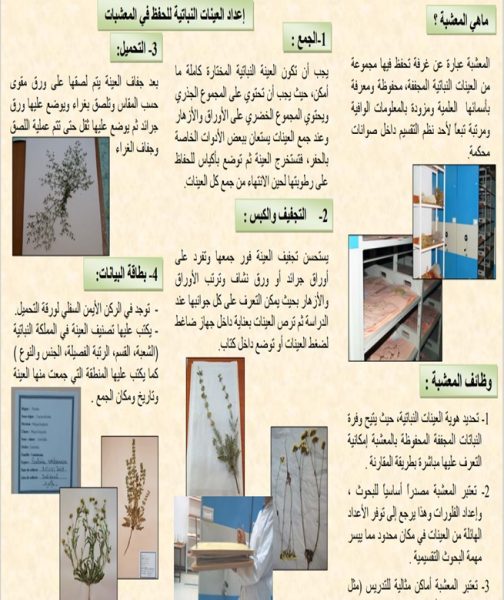
Tissue laboratory
The tissue laboratory is one of the important laboratories that must be approved for life sciences students because it aims to:
- Teaching the main foundations and rules for examining microscopic slides, the mechanism of their preparation, and distinguishing between preparation methods for different organs and tissues and for both animals and plants alike.
- Preliminary studies students gain experience and skills in the field of histological examination.
- Examining high-quality histological sections for postgraduate students (master’s and doctoral degrees) and supplying educational institutions with microscopic slides according to the requests of those institutions.
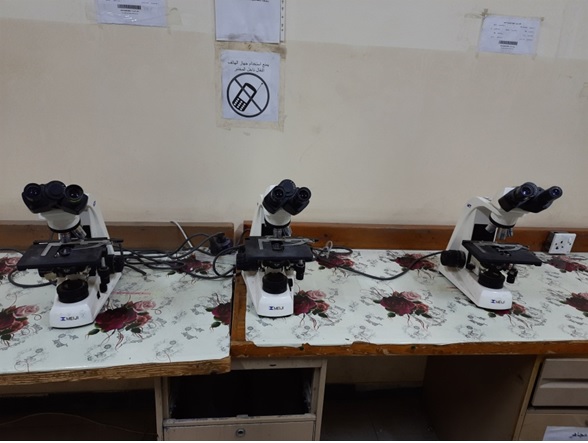
Pathological analysis laboratory
The Analytics Laboratory aims to understand the facts related to the basic sciences and keep up with developments that enable the student to work in the functional fields that fall within this field, in addition to preparing qualified graduates to work in scientific research fields who have the ability to overcome problems during laboratory work, and to prepare female specialists in scientific research fields. They hold a high qualification (Master’s and Doctorate) and scientific experience that helps them solve problems and provide scientific and research consultations. And also conduct all laboratory analyzes for students, employees and teachers.
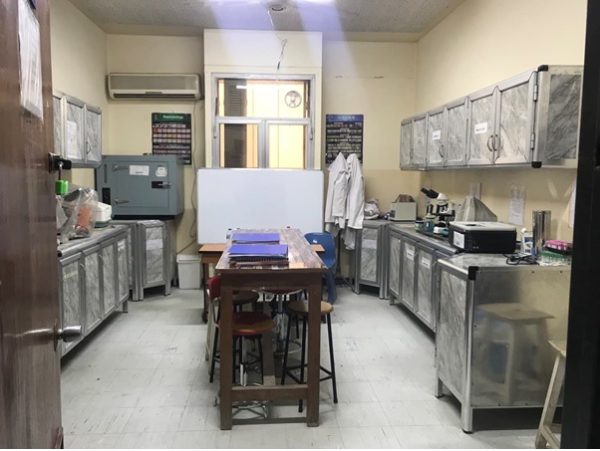
Chordata laboratory
It is one of the laboratories of the Life Sciences Department and aims to study the embryonic formation of living organisms, starting with the spear, frog, and chicken, and ending with humans, the highest level of the ladder of evolution. Students are introduced to chordates by studying glass slides using a compound light microscope, in addition to seeing gypsum models of the different stages of the organisms mentioned previously.
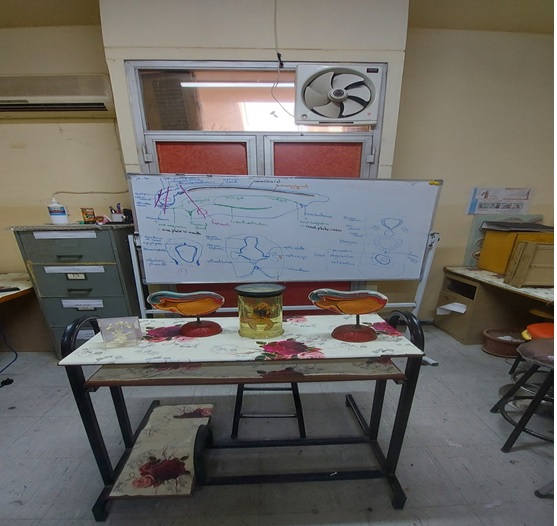
Advanced insect laboratory
The Advanced Insect Laboratory aims to prepare competent female students with skills in methods of collecting insects, arranging them, and preserving dried specimens of them, and to prepare specialists in the fields of insect science and their environment who hold a high qualification (Master’s and Doctorate) and scientific experience that will help them solve problems and provide scientific and research consultations. Contributing to the development of scientific research in Iraq by conducting scientific research and contributing to solving the problems of state institutions related to laboratory specialization.
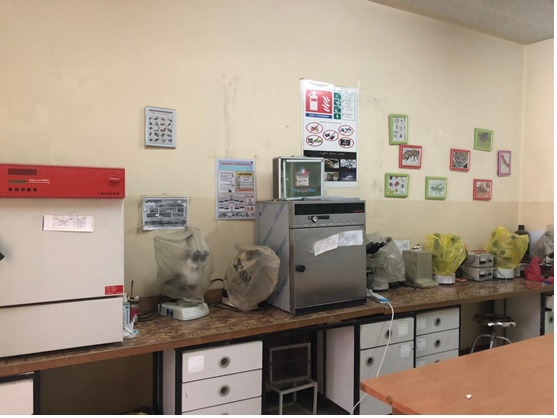
Virus laboratory
The Virus Laboratory aims to identify viruses, their composition, and their theoretical classification in the laboratory, as well as diagnostic methods for viruses through the use of some diagnostic kits, as well as studying the method of how to inoculate chicken eggs with viruses, as well as studying the tissue culture of the virus (without using a virus due to the difficulty of obtaining it).
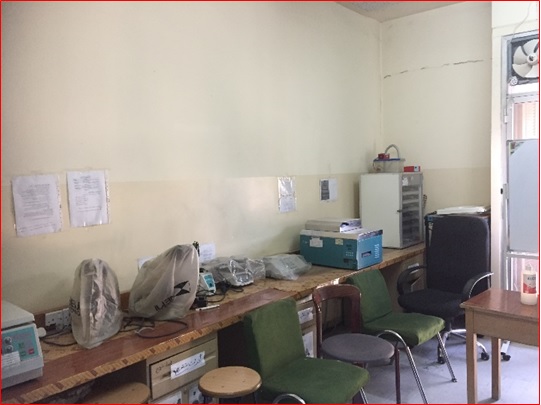
Advanced Immunology Laboratory
The Advanced Immunology Laboratory aims to understand the facts of basic sciences and keep up with developments that enable the student to work in the functional fields that fall within this field, in addition to preparing qualified graduates to work in scientific research fields who have the ability to overcome problems during laboratory work, and to prepare female specialists in scientific fields. They have a high qualification (Master’s and PhD) and scientific experience that helps them solve problems and provide scientific and research consultations.
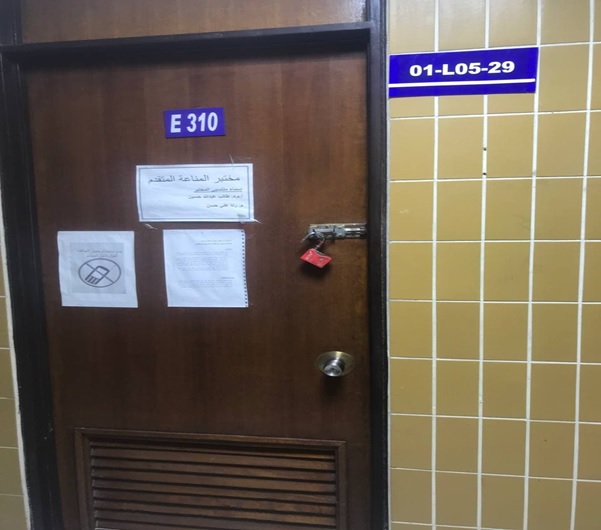
Mycology laboratory
The Primary Fungi Laboratory contributes to the development of scientific research in the field of fungi by conducting scientific research and contributing to solving the problems of state institutions related to the laboratory’s specialization in a way that keeps pace with modern scientific development, which contributes to serving the citizen and the public interest in obtaining the highest levels of health and safety. The laboratory also helps in understanding the facts about mycology and keeping pace with developments so that female students can work in the career fields that fall within this field.
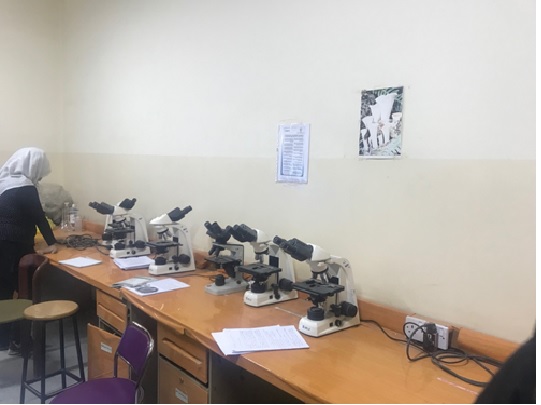
Botany laboratory
Teaching the main foundations and rules in a detailed study and comparison of slides of plant samples from different plant tissues and plant tissues, and gaining experience in distinguishing between monocotyledonous and dicotyledonous plants, and desert, aquatic, and terrestrial plants, as well as preparing specialists in the field of plant physiology, studying the effectiveness of different plants, and diagnosing diseases and element deficiencies, preparing qualified graduates to work in Microscopic preparations, qualifying them to occupy work sites with high efficiency and having the ability to overcome the problems they face during laboratory work.

Bacterial preparations laboratory
The Bacterial Preparations Laboratory aims to understand the facts about bacteria and keep pace with the rapid developments in the field of these microorganisms, which leads to making female students possess the capabilities that enable them to work in the functional fields that fall within this specialization. Preparing qualified graduates to work in the fields of bacterial and microbial diagnosis and occupying qualified positions efficiently. High in society and have the ability to overcome problems during laboratory work. Preparing female specialists in the fields of microbial and bacterial diagnosis who hold a high academic qualification (Master’s and PhD) and scientific experience to help them solve microbial problems and provide scientific and diagnostic consultations.
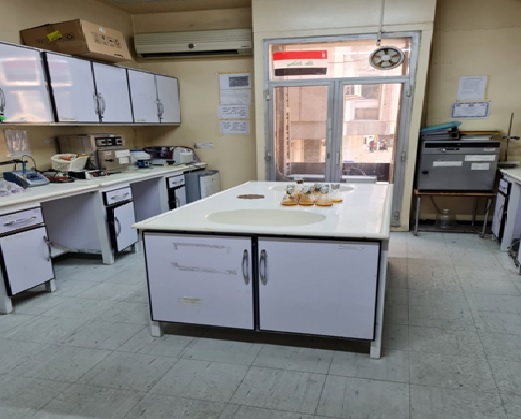
Laboratory Fungi Preparations
The Fungi Preparation Laboratory contributes to the development of scientific research in the field of fungi by conducting scientific research and contributing to solving the problems of state institutions related to the laboratory’s specialization in a way that keeps pace with modern scientific development, which contributes to serving the citizen and the public interest to obtain the highest levels of health and safety.

Insect laboratory
The Insect Laboratory aims to understand the facts about the basics of entomology and keep up with developments that enable the student to work in the functional fields that fall within this field. It aims to prepare qualified graduates to work in the fields concerned with agricultural and veterinary insect pests.
Conducting various tests on populations of wild insects, whether those prepared for research or studies, by exposing them to physical, chemical, and biological pollutants in a way that keeps pace with the scientific development taking place in the world, which serves the public interest of the citizen to obtain the highest levels of public health and safety.
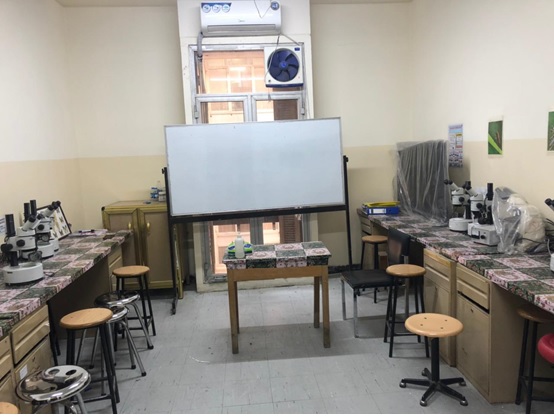
Advanced Environmental Pollution Laboratory
Understanding the facts about the basics of environmental pollution in the atmosphere, water, and land, and keeping up with the areas of its development and diversity, which enables the graduate to work in the functional fields that fall within this specialization or field. As well as preparing qualified graduates to work in the field of measuring and estimating pollutants in samples taken from different environments, as well as conducting practical experiments under laboratory conditions, and qualifying them to occupy work sites with high efficiency. They also have the ability to overcome the problems they face during laboratory work.

Advanced Parasitology Laboratory
The Advanced Parasitology Laboratory for graduate studies and research specializes in isolating, diagnosing and studying parasitic infections and controlling infectious diseases by conducting scientific research, as well as studying the negative effects caused by these parasites. The laboratory provides a service to researchers by conducting a wide range of laboratory tests to diagnose and identify parasitic diseases.
